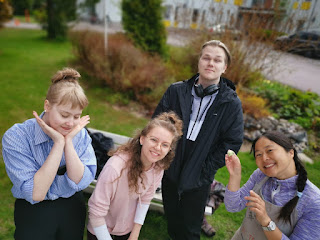[It's a post talking about the picnic that happened on 15th of May.]
I.S. 1 decided to go picnic together – a farewell party for Niko, who is going to leave Kalajoki and join Oulu ice hockey team. Xiang believes that creating different learning spaces can inspire dynamical communications, hence she is more than willing to go out with I.S. students. Everyone was going to bring their favorite snacks to share. Unfortunately, but not surprisingly (smile), one hour before we left for the park, Niko said that he couldn’t come because he was sick. But Johanna had made a mega-fine cake with mega-delicate decoration on top for him!!!!!!
 |
| Cake made by Johana! |
So, we changed our plan to stop by Niko’s home before heading to the park! Xiang also cancelled her “treasure hunting” game which was planned on their way from lukio to the park. (Xiang knows that she would be too flexible to survive in German. Luckily that she is in Finland. She often changes her plans when students give their suggestions. Fortunately, her students always respect her decision when she has to face many different suggestions, which greatly saves her life.)
After having the delicious cake with Niko in front of the gate, we marched to Plassi Park. Sun shines in front of us and leads a bright way to the Park. On the way there, Xiang learned that she could do many things better, for instance: she should have known when to be inclusive and when to be exclusive in terms of creating the learning environment; she could have bought and brought a picnic cloth (but she is living a life under budget for her future dream, please do understand) … She also hopes that her students can learn their own lessons by talking to each other.
 |
| Ready to have cake with Niko! |
I.S. students are always the best. We sat in a circle and started to share our snacks and drinks. At the same time, they divided into 5 groups to discuss questions prepared by Xiang:
- Describe your favorite school day in the past one year. What made that day very special to you?
- Where do you look for inspirations (in terms of connecting your experiences, expectations, perspectives and strong desire to try something new)?
- Imagine you are running into a burning house to save a child. On the way to the child’s bedroom, you discovered that there is a Picasso on the wall. You could save and liquid that, use the 75 million dollars you get from that sale to save many more children than one. If you can only save one, Picasso or the baby? Tell us why.
- If you have the chance to design a classroom which is inspirational, connecting, and encouraging, what are the most 3 important things you would like to have?
- Are you currently obsessed with some book, TV series, Podcast, website, people etc. that you would like to recommend to the rest of us?
Here you may find our discussions:
The picnic lasted until the rest of us felt exhausted. :) It’s a beautiful day.













